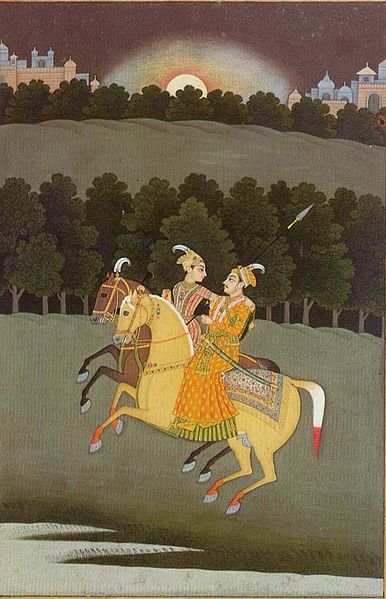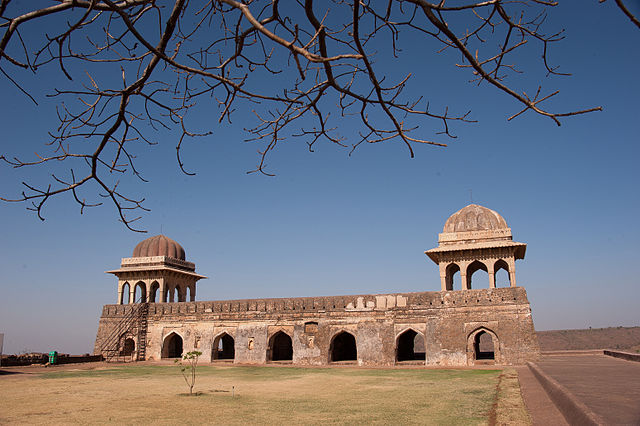The cordial tie between Hindus and the Muslims is often credited to Emperor Akbar. However the seed of this long lasting tie was not sown in Agra, but in a not so far away province in the present day Madhya Pradesh called Mandu. This initiation finds a unique place in our history because the roots of this beautiful unison was not greed, lust or want unlike witnessed in Mughal chronicles but out of something very pure termed as “love”.

Baz Bahadur and Rupmati, Provincial Mughal (Murshidabad) styleSource: India Office Library, Colour Prints, No. 17: Provincial Mughal Painting: Baz Bahadur and Rupmati. Scan by FWP, Sept. 2001. via Wikipedia
Interestingly, it was not a political alliance, truce or a treaty unlike those times but a love affair between Sultan Baz Bahadur of Mandu and a Hindu singer Roopmati who later became his queen and came to be known as Rani Roopmati.
Baz Bahadur and Rani Roopmati: The Beginning of their Love Story
Baz Bahadur was the Sultan of Malwa who inherited the province after the death of his father Shujaa’t Khan, a governor under Sher Shah Suri. It is noted that in 1555 he declared himself independent and it was during this time only he met his lady love while out on a hunting expedition.
One day when he was out for hunting, a musical tune reached his ears amidst the wild trees and shrubs. The Sultan slowly went in the direction of the tune only to come across a stunning shepherdess singing along with her group of friends. She was none other than Roopmati, the Sultan’s future wife. Being, a woman of rare charm, Baz Bahadur fell instantly in love with her soon after getting mesmerized by her exceptional beauty and captivating voice.
He however didn’t force Roopmati for submission but asked her hand in marriage and requested her to accompany him to his capital. Roopmati being a woman from the lower strata could not say “no” to her Sultan, however, laid her own condition, that, the Sultan would have to construct a ‘palace for her’ right within the sight of River Narmada. The Sultan readily agreed to the wish of his love and thus was raised the famous Rewa Kund reservoir of Mandu, only to fulfill Roopmati’s fancy.
Even today, it is one of the most visited spots of Madhya Pradesh. Those who tour Madhya Pradesh do make it a point to witness this beautiful set which the lover constructed for his ladylove.

After the construction, the two then married with great pomp and honor both in Muslim and Hindu style.
Love blossomed between the two greatly. While, Rani Roopmati was a great reciter, poetess, composer, and singer, Baz Bahadur was a gifted lyricist and musician. They were so involved with each other that they could hardly stay away from each other – neither in the day nor during the night. This made Baz Bahadur negligent towards his kingdom. He paid no attention to his kingdom and from a Sultan he was soon transformed into a musician and lover. Meanwhile, the news of his laxity towards his kingdom had reached the ears of Akbar and so was the tale of Roopmati’s beauty to his General and Foster brother Adham Khan.
The Heartbreaking Twist
It was Friday, the twelfth day of Rajab, year 968 of the Hegira and 1561 of the Christian Era when the Mughal troops led by Adham Khan attacked Malwa. Baz Bahadur reached Sarangpur with a very small army to challenge the huge Mughal army. However, when he felt that he would be defeated and killed, he then fled from Mandu leaving his harem, province and most prominently his love, Roopmati all alone. Wonder, what made him coward. Maybe Socrates was write in quoting, “The hottest love may have the coldest end.”
When Adham Khan got to know about Baz Bahadur’s escape he tried to lay his hand over Roopmati. However, Rani Roopmati being a lady of great chaste continued to be faithful to her lover even till the last unlike Baz Bahadur who fled away. When she realized that Adham Khan would capture her soon and disgrace her, she consumed poison and set herself free from any disgrace.
And this led to the end of a beautiful loving tale… But, even today it is still alive in the folklore of the Malwa Province.
P.S: Appreciating her loyalty for her husband, Rani Roopmati was buried with respect by Mughal General Adham Khan. Baz Bahadur yet again captured Malwa but for a very short period of time as Emperor Akbar invaded the area. Post that, he wandered in the forest and the mountains for a short period and then submitted himself to Mughal Emperor Akbar. Next, he was made mansabdar in Akbar’s Government.

